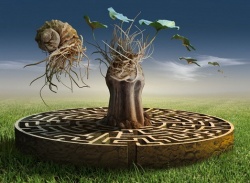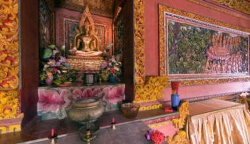Difference between revisions of "Nigrodha"
([[Category:]]) |
|||
| Line 1: | Line 1: | ||
| − | + | {{DisplayImages|595|1637}} | |
<poem> | <poem> | ||
1. [[Nigrodha]] | 1. [[Nigrodha]] | ||
| − | A Paribbajaka. Once, when he was staying with a large number of colleagues at the Udumbarikarama near [[Rajagaha]], Sandhana, on his way to see the [[Buddha]], stopped him and entered into [[conversation]]. The [[Buddha]], by his [[divine ear]], hearing their talk, approached them and continued the [[discussion]] with [[Nigrodha]]; this [[discussion]] is recorded in the [[Udumbarika | + | A [[Paribbajaka]]. Once, when he was staying with a large number of colleagues at the [[Udumbarikarama]] near [[Rajagaha]], [[Sandhana]], on his way to see the [[Buddha]], stopped him and entered into [[conversation]]. The [[Buddha]], by his [[divine ear]], hearing their talk, approached them and continued the [[discussion]] with [[Nigrodha]]; this [[discussion]] is recorded in the [[Udumbarika Sihanada Sutta]]. |
| − | D.iii.36ff.; this [[discussion]] is also referred to in the [[Kassapa | + | D.iii.36ff.; this [[discussion]] is also referred to in the [[Kassapa Sihanada Sutta]] (D.i.175 f.). There [[Nigrodha]] is said to have felt great [[joy]], but this is not mentioned in the [[Udumbarika Sihanada]] (see D.iii.57). |
2. [[Nigrodha]] | 2. [[Nigrodha]] | ||
| − | The [[Bodhisatta]] born as the son of a Banker in [[Rajagaha]], later becoming [[king]] of [[Benares]]. For details see the [[Nigrodha | + | The [[Bodhisatta]] born as the son of a [[Banker]] in [[Rajagaha]], later becoming [[king]] of [[Benares]]. For details see the [[Nigrodha Jataka]]. |
| − | |||
| − | + | 3. [[Nigrodha Thera]] | |
| − | [[Nigrodha]] is probably [[identical]] with Salamandapiya of the [[Apadana]]. Ap.ii.431f.; but the same [[Apadana]] verses are also given under [[Tissa]] [[Thera]] (ThagA.i.273). | + | He belonged to an {{Wiki|eminent}} [[brahmin]] family of [[Savatthi]]. On the day of the [[dedication]] of [[Jetavana]], he saw the majesty of the [[Buddha]] and entered the [[Order]], becoming an [[arahant]] soon after. Eighteen [[kappas]] ago, in the [[time]] of [[Piyadassi Buddha]], he left great riches and became an [[ascetic]], dwelling in a [[sala grove]]. Once, [[seeing]] the [[Buddha]] wrapped in [[samadhi]], he built a bower over him, and stood there with clasped hands until the [[Buddha]] awoke from his [[samadhi]]. Then, at the [[Buddhas]] wish, the [[Sangha]] too came to the [[sala grove]], and in their presence the [[Buddha]] predicted the [[ascetics]] future (ThagA.i.74f; Thag.21). |
| + | |||
| + | [[Nigrodha]] is probably [[identical]] with [[Salamandapiya]] of the [[Apadana]]. Ap.ii.431f.; but the same [[Apadana]] verses are also given under [[Tissa]] [[Thera]] (ThagA.i.273). | ||
4. [[Nigrodha]] | 4. [[Nigrodha]] | ||
| − | See Nigrodhamiga and | + | See [[Nigrodhamiga]] and [[Vattabbaka Nigrodha]]. |
| + | |||
5. [[Nigrodha]] | 5. [[Nigrodha]] | ||
A [[Sakiyan]], [[owner]] of the [[Nigrodharama]] (q.v.). J.i.88. | A [[Sakiyan]], [[owner]] of the [[Nigrodharama]] (q.v.). J.i.88. | ||
| + | |||
6. [[Nigrodha]] | 6. [[Nigrodha]] | ||
| − | Commonly known as [[Nigrodha]] [[samanera]]. He was the son of [[Sumana]], the eldest of Bimbisaras children, and his mother was [[Sumana]]. When [[Asoka]] slew [[Sumana]], his wife, who was with child, fled to a candala village, where the [[guardian deity]] of a [[nigrodha]] [[tree]] built her a hut. Here she gave [[birth]] to her son, whom she named after her benefactor. The chief candala looked after them. When [[Nigrodha]] was seven years old, the [[Thera]] Mahavaruna [[ordained]] him, and he became an [[arahant]] in the tonsure hall. One day, while walking near the palace, [[Asoka]] saw him and, because of their connection in a past [[life]], was attracted by him. [[Nigrodha]] had been one of the three brothers who gave [[honey]] to a [[Pacceka Buddha]] in a past [[life]] (for the story see [[Asoka]] and Mhv.v.49ff). [[Nigrodha]] had called the [[Pacceka Buddha]] a candala, hence he was born in a candala village. [[Asoka]] invited [[Nigrodha]] to the palace and entertained him, and [[Nigrodha]] {{Wiki|preached}} to him the [[Appamada]] [[Vagga]]. The [[king]] was greatly [[pleased]], and [[offered]] to give [[food]] daily at the palace to thirty two [[monks]] in Nigrodhas [[name]]. | + | Commonly known as [[Nigrodha]] [[samanera]]. He was the son of [[Sumana]], the eldest of [[Bimbisaras]] children, and his mother was [[Sumana]]. When [[Asoka]] slew [[Sumana]], his wife, who was with child, fled to a [[candala]] village, where the [[guardian deity]] of a [[nigrodha]] [[tree]] built her a hut. Here she gave [[birth]] to her son, whom she named after her benefactor. The chief [[candala]] looked after them. When [[Nigrodha]] was seven years old, the [[Thera]] [[Mahavaruna]] [[ordained]] him, and he became an [[arahant]] in the tonsure hall. One day, while walking near the palace, [[Asoka]] saw him and, because of their connection in a past [[life]], was attracted by him. [[Nigrodha]] had been one of the three brothers who gave [[honey]] to a [[Pacceka Buddha]] in a past [[life]] (for the story see [[Asoka]] and Mhv.v.49ff). [[Nigrodha]] had called the [[Pacceka Buddha]] a [[candala]], hence he was born in a [[candala]] village. [[Asoka]] invited [[Nigrodha]] to the palace and entertained him, and [[Nigrodha]] {{Wiki|preached}} to him the [[Appamada]] [[Vagga]]. The [[king]] was greatly [[pleased]], and [[offered]] to give [[food]] daily at the palace to thirty two [[monks]] in Nigrodhas [[name]]. |
</poem> | </poem> | ||
{{R}} | {{R}} | ||
[http://www.wisdomlib.org/definition/nigrodha/index.html www.wisdomlib.org] | [http://www.wisdomlib.org/definition/nigrodha/index.html www.wisdomlib.org] | ||
| + | [[Category:Buddha Shakyamuni]] | ||
Latest revision as of 13:54, 4 December 2013
1. Nigrodha
A Paribbajaka. Once, when he was staying with a large number of colleagues at the Udumbarikarama near Rajagaha, Sandhana, on his way to see the Buddha, stopped him and entered into conversation. The Buddha, by his divine ear, hearing their talk, approached them and continued the discussion with Nigrodha; this discussion is recorded in the Udumbarika Sihanada Sutta.
D.iii.36ff.; this discussion is also referred to in the Kassapa Sihanada Sutta (D.i.175 f.). There Nigrodha is said to have felt great joy, but this is not mentioned in the Udumbarika Sihanada (see D.iii.57).
2. Nigrodha
The Bodhisatta born as the son of a Banker in Rajagaha, later becoming king of Benares. For details see the Nigrodha Jataka.
3. Nigrodha Thera
He belonged to an eminent brahmin family of Savatthi. On the day of the dedication of Jetavana, he saw the majesty of the Buddha and entered the Order, becoming an arahant soon after. Eighteen kappas ago, in the time of Piyadassi Buddha, he left great riches and became an ascetic, dwelling in a sala grove. Once, seeing the Buddha wrapped in samadhi, he built a bower over him, and stood there with clasped hands until the Buddha awoke from his samadhi. Then, at the Buddhas wish, the Sangha too came to the sala grove, and in their presence the Buddha predicted the ascetics future (ThagA.i.74f; Thag.21).
Nigrodha is probably identical with Salamandapiya of the Apadana. Ap.ii.431f.; but the same Apadana verses are also given under Tissa Thera (ThagA.i.273).
4. Nigrodha
See Nigrodhamiga and Vattabbaka Nigrodha.
5. Nigrodha
A Sakiyan, owner of the Nigrodharama (q.v.). J.i.88.
6. Nigrodha
Commonly known as Nigrodha samanera. He was the son of Sumana, the eldest of Bimbisaras children, and his mother was Sumana. When Asoka slew Sumana, his wife, who was with child, fled to a candala village, where the guardian deity of a nigrodha tree built her a hut. Here she gave birth to her son, whom she named after her benefactor. The chief candala looked after them. When Nigrodha was seven years old, the Thera Mahavaruna ordained him, and he became an arahant in the tonsure hall. One day, while walking near the palace, Asoka saw him and, because of their connection in a past life, was attracted by him. Nigrodha had been one of the three brothers who gave honey to a Pacceka Buddha in a past life (for the story see Asoka and Mhv.v.49ff). Nigrodha had called the Pacceka Buddha a candala, hence he was born in a candala village. Asoka invited Nigrodha to the palace and entertained him, and Nigrodha preached to him the Appamada Vagga. The king was greatly pleased, and offered to give food daily at the palace to thirty two monks in Nigrodhas name.

